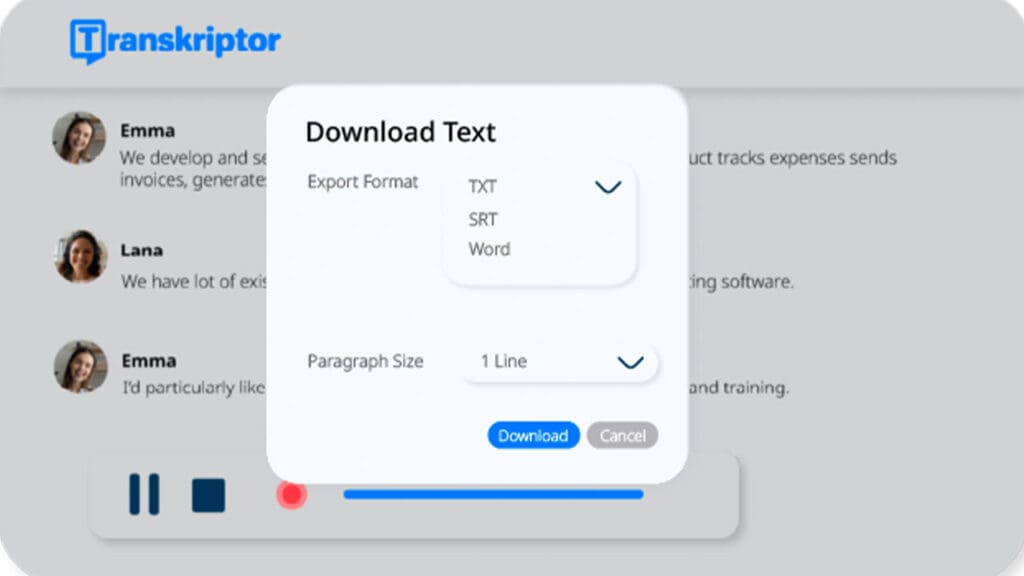Artificial intelligence (AI) has become a central topic of discussion in recent years, as it finds integration into various aspects of our daily lives, offering enhancements in efficiency and productivity. This technological evolution spans across multiple domains, including but not limited to, visual and video production, voice assistants, autonomous vehicles, and recommendation engines.
Amidst these advancements, voice-to-text tools have emerged as particularly significant due to their practicality and ability to augment workforce productivity.
One standout example in the realm of voice-to-text conversion tools is Transkriptor. This tool is recognized for its ability to efficiently and accurately convert long audio files into text within minutes. As a domestically developed solution, Transkriptor highlights the ongoing innovation in artificial intelligence, providing users with a powerful tool to streamline their transcription processes.
Such tools not only save time but also facilitate a wide range of applications from content creation to professional documentation, making them indispensable assets in today’s fast-paced world.
What exactly do voice-to-text tools do, what are they used for?

Nowadays, voice-to-text tools are utilized by a diverse user base spanning across various industries, including students, teachers, lawyers, and journalists. These individuals leverage such tools to transcribe podcasts, lectures, interviews, and seminars.
The appeal of these tools lies in their ability to convert lengthy audio recordings into text through a few simple steps. This convenience and efficiency make voice-to-text tools invaluable for users seeking to streamline their workflow and enhance productivity in their respective fields.
So what are the features and advantages of Transkriptor?
In today’s world, a plethora of AI-supported tools are available that significantly simplify our lives. However, staying updated in this rapidly evolving domain is equally crucial. Transkriptor distinguishes itself precisely in this aspect.
Thanks to its AI and machine learning algorithms, Transkriptor is continually updated, ensuring its features remain at the forefront of technology.
Taking a closer look at its functionalities:
- Transkriptor is accessible on both mobile devices and via the web, offering versatility for users.
- The platform boasts a user-friendly interface that is straightforward to navigate.
- It can convert a 10-minute audio file into text in merely 2-3 minutes, showcasing its efficiency.
- Post-transcription, users can edit the text much like in a word processor.
- The tool supports importing audio files directly from cloud storage services such as Dropbox, Google Drive, and OneDrive.
- It features language recognition, supporting transcription in over 40 languages, and offers translation options post-transcription.
- Transkriptor claims up to 99% accuracy in transcription, although this is dependent on the quality of the audio file.
To utilize Transkriptor, users simply upload the desired audio file for conversion. The system’s AI technology then processes the audio to text. Upon completion, users are notified via email, with options to edit the transcript using the platform’s editing tools, including the ability to add timestamps.
Available on both Google Play and the App Store, Transkriptor ensures accessibility for users whenever needed.
Transkriptor can convert popular file formats such as MP3, MP4, and WAV into text swiftly with AI support, catering to a wide range of needs.
Moreover, the application facilitates the creation of detailed meeting notes with a single click, enhancing productivity and time management in educational and business settings, including Zoom, Google Meet, and Microsoft Teams meetings.
The usage areas of voice-to-text tools are quite wide;
Voice recognition technology is revolutionizing various sectors by enhancing efficiency and accessibility. Here’s a closer look at its impact across different fields:
- Healthcare: Management of Patient Records – Doctors and healthcare professionals can digitize patient records more swiftly and accurately by recording conversations with patients using voice recognition systems, eliminating the need for manual note-taking.
- Clinical Trials – Researchers can expedite the data collection process by using voice recognition technology to transcribe participants’ verbal responses into text.
- Education: Preparation of Lecture Notes – Voice recognition technology allows teachers and students to transcribe lectures or discussions, facilitating the easy sharing and reviewing of lecture notes.
- Accessibility for Students with Disabilities – The technology enhances educational material accessibility by converting speech to text for students with hearing impairments.
- Legal Sector: Court Records – Lawyers and judges can employ voice recognition technology to convert depositions and trial recordings into text, streamlining the information access and filing processes.
- Contract Review – Law firms can record and transcribe meetings and negotiations, ensuring important discussions are documented and available for analysis.
- Subtitle Generation – Voice recognition facilitates automatic captioning for TV shows, movies, and online videos, improving accessibility for viewers with hearing impairments.
- Content Analysis – Transcription of radio broadcasts and podcasts enables analysis of specific topics or trends.
- Call Centers – Transcribing conversations between customer representatives and customers into text helps improve service quality, identify training needs, and monitor customer satisfaction.
- Automating Frequently Asked Questions – Voice responses can be converted into automated text-based answers to common queries, streamlining customer service.
These applications showcase the versatility and transformative potential of voice recognition technology across multiple industries, improving both efficiency and accessibility.
You may also like this content
- The 5+ Best Text To Speech Generators in 2025
- Discover Unique Artificial Intelligence Sites That Make Life Easier in 2025
- Free AI Programs for Visuals and Music Creation in 2025

